by
Rhythm Scene Staff
| Aug 01, 2015
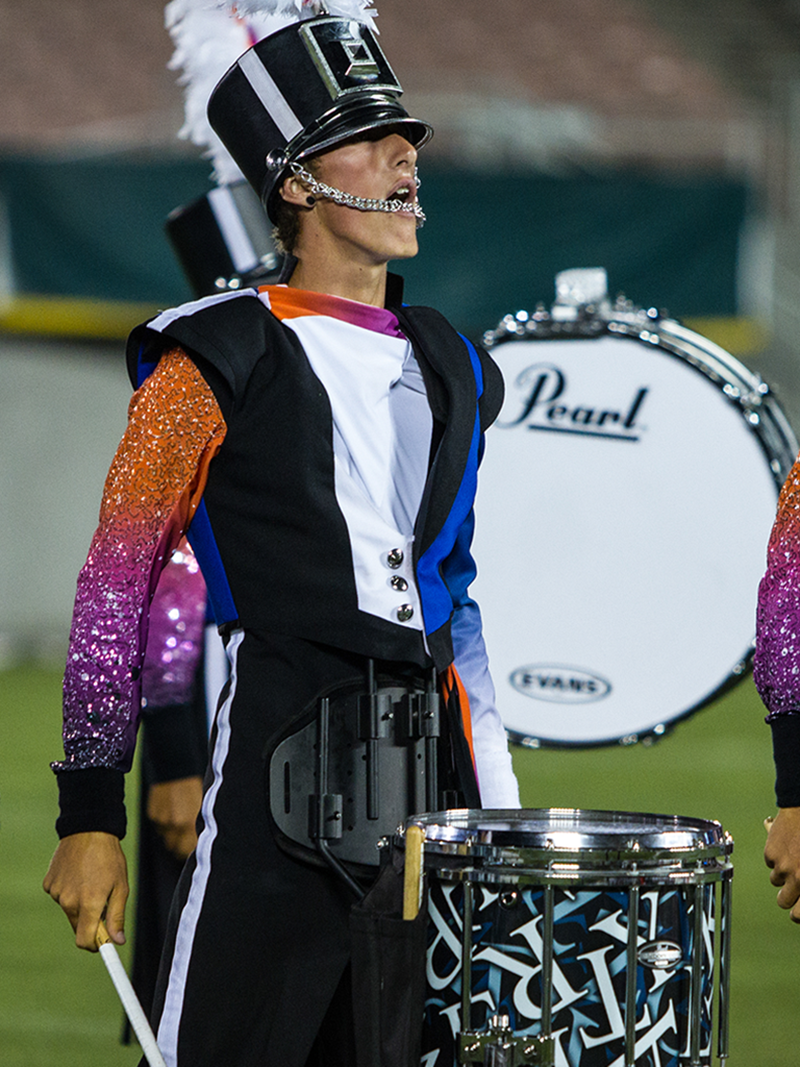
Photo by J. Parker Staten
As we enter August, Drum Corps International (DCI) groups are making the final push towards World Championships. Corps are fervently working these last few weeks towards perfecting their craft, making final changes, and keeping their members on point for the final journey to Lucas Oil Stadium in Indianapolis. With advancements in social media, marching aficionados around the country are frequently following scores, watching lots of videos, and Tweeting or Instagraming in support of their favorite corps.
Always a corps to be reckoned with is the Blue Devils, a 16-time World Champion. I recently spent a day with the Blue Devils in Riverside, California and sat down with Director of Percussion Scott Johnson—otherwise known throughout the world as “SCOJO.” We discussed the many facets of Scott’s history and career in drum corps, the scope of outreach that the marching arts activity has on the big picture of life, and all things Blue Devils!
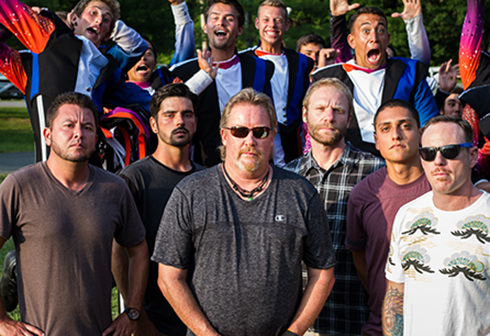
Scott (center) with the Blue Devils staff | photo by J. Parker Staten
Rhythm! Scene: What year is this for you with the Blue Devils organization? Can you share with us a little of your history with the drum corps activity?
Scott Johnson: This is my 37th year with the organization and 35th year on staff. I marched with the Blue Devils from 1976 to 1979 and was actually on staff the last two years that I marched. My time on staff began when our snare tech quit right before tour in 1978. He taught the whole winter season and thought we weren’t going to be very good because we had a lot of age-outs. So in a panic move, he left a letter on caption-head Rick Odello’s doorstep and took off. Rick and Jerry Seawright, Corps Director at the time, decided to hire me and a couple of other guys to teach the line. This basically made me a professional drum corps snare drummer because I was marching and receiving a paycheck. It wasn’t much, but it helped pay my rent. After shows when the corps was lining up for retreat, we were changing out of our uniforms into street clothes so that we could go talk to the judges in critique.
R!S: Did you meet any resistance with other members in this peer-leading-peer situation?
Johnson: I didn’t. They also hired my friend Terry, who was in the snare line, and another guy who aged out the year before to stand outside the line. There were essentially three snare techs, which was unheard of at the time. It was a great experience, and it was an opportunity for me to get my foot in the door with the judging community as a marching member. When the judges saw us on the field in uniform, it was a little more friendly because we knew them off the field as well. As they were walking on the field they would come up to us and we would say, “Alright man, that thing we talked about, check it out tonight.”
R!S: How did that season end?
Johnson: We ended up third overall.
R!S: What happened after that season in 1978?
Johnson: I had one more year left, so I marched and aged-out in 1979. After this I stayed on staff from 1980 to 1989 as a tech. In 1982, we brought on Tom Float to be the caption head. I was still a tech and worked with the tenors, snares, or whatever was needed. That was obviously a good run with Float. We were together eight years and had four percussion titles in a row: 1983 through 1986. I taught the winter of 1989 and then took the summer off. At that point I started a company, Diablo Valley Digging, with one of my friends that I aged out with, Terry Shalberg. We bought a Bobcat and a dump truck, and were digging swimming pools for a living and whatever else people would hire a Bobcat for.
I was fed up with drum corps—the judging system and everything else—so I left and thought I was done with drum corps. I worked construction for a couple of years and was making decent money, but after a while it became a grind and was not rewarding at all. I had an epiphany that I needed to get out of construction and needed to be teaching again. I tried to go back to the Blue Devils in the winter of 1990. I called Mike Moxley, the director at the time, to talk about getting back on board and he said, “Well we can’t pay you. We have other staff members already in place.” I thought, “Wow, that’s a little disappointing.”
So I called my good friend Glen Crosby, who was teaching Santa Clara Vanguard, and told him I wanted to teach again. We were great friends; I was the best man in his wedding and he was in my wedding, but when I called him, he hung up on me. Then within two minutes my phone rang and it was Ralph Hardimon, who said, “Yo, you’re hired.” I said, “I can’t teach the Vanguard; you’re kinda the enemy.” The rivalry between Concord and Santa Clara back in those days was intense. However, the more I talked to Ralph, I was like “Okay, this could be kind of cool.”
I went to Santa Clara for the 1990 season to teach with Ralph and Glen. Ralph ended up leaving the last part of the tour, so I took over the program to finish the year and Gail Royer officially hired me as caption head in 1991, where I remained through 1993. The Blue Devils wanted me back, but weren’t willing to give me the caption head position that I felt I was ready for. Gail Royer was willing to give me that chance, so I took it. We won percussion my first year with the Miss Saigon show. It was perfect for percussion because the horn book was so open that the percussion had lots of space to fill and many opportunities to supply velocity.
R!S: Sounds like you had a great run at SCV and in having the opportunity to gain experience being a caption head. When did you go back to the Blue Devils?
Johnson: I went back to the Blue Devils as Director of Percussion in 1994. Dave Gibbs became the director of the Blue Devils in the late season of 1991 and was trying to get me to come back to the program, but I kept saying, “No, I’m happy where I’m at.” But with changes to the program—director changes, staff changes, etc.—I decided to meet Dave for lunch and thought, “It’s time to come home.” And I’m still here!
R!S: With your almost four decades in the activity and more specifically with the Blue Devils, you and the organization have created quite a legacy and a family. What do you attribute to building and maintaining this impressive lineage?
Johnson: The Blue Devils organization is a big family, and one of the reasons I feel the percussion section specifically is such a close-knit group is because I’ve been there forever. I know and was a part of so much of the history of the corps, so I can relate to everybody—not only the current students, but the majority of the alumni as well. We take time to sit down and have what I call history lessons. I ask them who all the percussion caption heads and corps directors have been through the Blue Devil history. It is interesting how many people they don’t know that I think they should know. I make sure they know who came before them and why they came before them. Anytime anyone who has marched previous years shows up to a rehearsal or parking lot warm-up I try to always introduce them to the line and say, “Here is your ‘older’ brother or sister.”
R!S: I had the opportunity to witness that culture this year when I watched your lot warm-up at the Riverside, California show. That is like a home show for the Blue Devils, and the place was packed with percussion alumni. I’m sure when the current members experience that energy, they understand that they will be on that side of it one day and look forward to the legacy they will leave to the next generation.
Johnson: Exactly!
VIDEO: Blue Devils Tour Report
R!S: So 37 years of students with approximately 30 to 40 percussionists equals well over a thousand lives you have mentored within the Blue Devils organization over the years—and that is just the percussion section. Have you had any second-generation kids come through the program yet?
Johnson: Not that have marched, but I have had second-generation kids that I’ve cut. Last year our section leader, Brandon, and I were chatting and he said, “Hey, you cut my dad in 1980. I was like, “What, you’re kidding me?” I hadn’t made the connection. Anyway, his dad is a great guy and I see him all the time. Another example is Rick Odello’s family. Rick was my teacher and was the caption head when I marched in the 1970s. His father actually started the Blue Devils organization and all four of his sons came through the A corps in the early 2000s. Two of them currently teach the B corps and have been really successful with that program. Rick is now the director of the B and C corps programs to date. There are a lot of tradition and family ties that exist from the beginning of the organization. It’s a very special place.
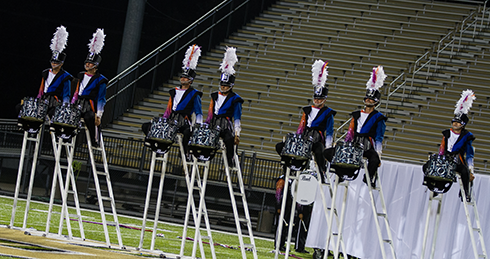
photo by J. Parker Staten
R!S: Let’s talk about the current Blue Devils drumline. Every year it seems you push the boundaries in the activity both musically and physically. How do you continue to come up with ideas that advance the activity?
Johnson: Three things come to mind. 1. Indoor percussion (WGI). I look at what all of those guys are doing and try to take the good stuff that might be able to work outdoors. 2. I get some ideas from the marching members. We sit down every year at the beginning of the season and say, “Okay, if you could watch the best drumline in the world, what would you want to see? What are they doing?” The staff is older, and these are the guys that are doing it every day. It is interesting to hear what their ideas are, and we really try to incorporate some of those into the show. 3. I’ve been doing a lot of solo work lately in genres outside the drum corps activity with guys like Tommy Igoe and Lalo Davila. Playing in different genres has pushed me to think a little differently and experiment with ideas that I might not have considered if only practicing rudimental styles. I try to come up with things I haven’t seen yet and then try to integrate some of those ideas into the show, if appropriate.
VIDEO: Scott performing with Tommy Igoe’s Big Band
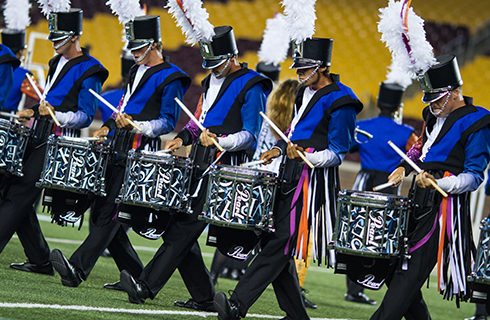
photo by J. Parker Staten
R!S: I’m sure it can be quite a challenge when you try to incorporate those ideas into a drumline situation where you are dealing with 10 to 12 players trying to execute those types of nuances.
Johnson: Absolutely! It takes a lot of control and touch and it takes an exceptional level of talent within the line. To be clear, every time we sit down and think of the Blue Devils program and what we are going to do, it is obviously not just me. Dave Glyde is the main arranger for the entire corps and puts the whole musical package together. I taught Dave when he was in the Blue Devils snare line in 1984—another part of the BD family and history. Dave came up through the Troopers, to Vanguard, and to the Blue Devils. He is now the musical director of the corps. We sit down at the beginning of every year, usually on a golf course somewhere, and say, “Okay, what are we going to do? What’s going to be different? What haven’t we seen?” We start throwing out ideas and try to figure out how to incorporate them into the show; we keep tweaking as the season progresses. We are still working on things and experimenting with things for this season even with just two weeks left.
R!S: I think it is great that your process is always one of evolution.
Johnson: Yes, absolutely. We make changes hourly.
R!S: Along those same lines, talk about risk-taking. How long do you leave something in that isn’t quite locking in or working right away?
Johnson: It all depends on how risky it is. I’ve been told by judges and by my peers that we tend to take more risk than anybody else. It’s just what we do! There have been many examples of things we left in the show that didn’t work until finals night.
R!S: And you are willing to take that chance?
Johnson: I’m definitely willing to take that chance if it is going to advance the activity. Whether we win or not is not the issue, but if it pushes the activity in the direction we think the activity should go, then it’s worth it. Some people seem to think that drum corps needs to be what is has been for the last 20 years, but I keep trying to think how we can make it better—more entertaining, better vocabulary etc. In fact, I think that goes back to why I am still in the activity. Some people ask me how long I’m going to keep doing this, and I say the reason I’m still here is because every year it is different and new. If it was the same every year, then I would have been gone a long time ago. But we are always trying new stuff, and that’s what is exciting and gives you the interest and energy to keep doing it every year. Again regarding risk, the thing to remember is that sometimes it works and sometimes it doesn’t.
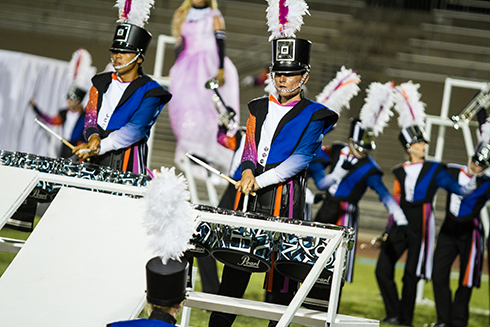
photo by J. Parker Staten
R!S: Let’s get to the million dollar question: What does it take to be a Blue Devil? What are the qualities you look for at auditions, and what are some of the separators when it comes down to a really close call between two players vying for a spot?
Johnson: Talent, confidence, attitude, experience, and athleticism. We are really fortunate that we typically get guys with experience. Sometimes I get the question, “Do you have to have experience to be in the Blue Devils?” The answer is no, but you are going up against guys that do. We have had drummers in the past that have made the line and haven’t had any previous experience marching corps, but it is rare. We also spend time in auditions just talking to the auditionees to get to know their personality. We think about the fact that we have to live and work together all summer long. You don’t want someone that no one gets along with or has issues.
R!S: So leave the ego at the door.
Johnson: For sure.
R!S: Can you read that pretty quickly?
Johnson: Usually. Typically you can read that by how they walk in the door. When some guys walk in to the room with the attitude that gestures “I’m here!” that’s when you go “uh-oh.” But what is interesting now, and this has definitely changed things from years ago, is that with the Internet and the indoor activity, everybody kind of knows everybody. So all of the guys pretty much know who is coming to audition for the line before they even get to auditions. They may say, “Oh, you are really going to like this guy” or “I don’t know about him or her.”
R!S: You also mentioned the physicality and athleticism aspect.
Johnson: Yes, they have to move as well as they play. I’m a firm believer that you have to look as good as you sound and sound as good as you look. If you don’t look good and can’t move well, then it’s just not a good presence. In our audition process, if you make it through the first weekend of drumming and hands, then the second weekend you go to the visual audition and we put you through very rigorous visual and physical testing to see if you are going to be able to hang with all of the visual demands and how quickly you can pick things up.
R!S: What are some of the factors that help you make decisions when people are vying for the same spot?
Johnson: Age can be a factor. If it is really close between two people, we will go with the youngest—the one who will be able to be with us for a couple years. The other biggest separator is how well they move while they play. As I mentioned, we make changes hourly, and we need a group of people who can quickly adapt to changes coming at them musically, mentally, and visually. I do an exercise at auditions where I play four counts of something and have them play it back to me. I keep adding on to those bars to see how long they can retain and mentally stay focused until they drop out. Our visual audition incorporates the same thing. We will take one of the exercises we are working on and add drill or different bodywork to see who can pick it up quickly and who can’t.
R!S: Is attitude ever an issue in the drumline?
Johnson: No, because we really don’t have any attitude problems. I mean seriously, kids these days, if they are coming to the Blue Devils and they make it, they don’t want to screw that up. Maybe in the 1980s we might have had some attitude problems, but kids these days are different. They are here for a reason. They have worked probably their whole career to get to this stage, and they are not going to mess it up by being stupid.
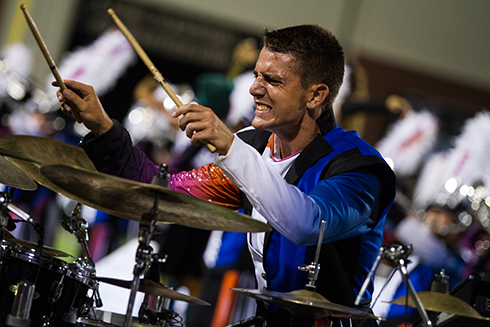
photo by J. Parker Staten
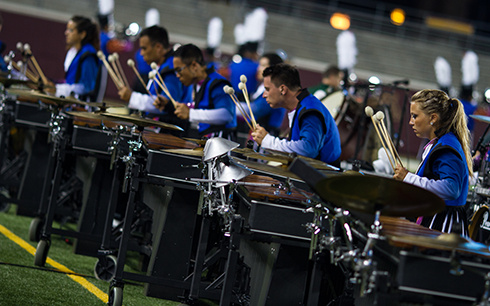
photo by J. Parker Staten
R!S: Speaking of “kids these days” as compared to previous generations, each year I see several Blue Devils performers peppered throughout WGI groups. Kids participating in indoor percussion has obviously contributed to the elevated level of skills demonstrated in today’s marching arts. What are some significant advantages you have noticed over the past few years with kids participating in the indoor activity? Conversely, are there any extra challenges?
Johnson: Well, just that we are a big believer and supporter of indoor percussion. We encourage our members to be in indoor groups. It is great training and fosters development of performance skills. The indoor activity has definitely increased the amount of movement these kids have been exposed to, and they are gaining more experience by drumming all year round. The only disadvantage is that we stopped having our March camp because that month is such a heavy WGI regional time. It works out, though, and hasn’t been a real issue because everyone is still drumming and performing. Additionally, a few years back we moved our April camp to be later in the month, after WGI World Championships, so that once we get to the April camp everyone is all in.
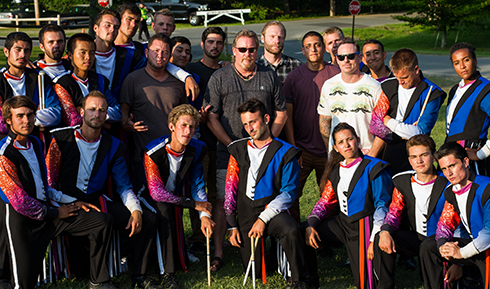
photo by J. Parker Staten
R!S: Besides the competitive nature of the activity, do you have any “go to” motivational tactics that you use to keep the line pushing forward when the rehearsal days get long and tedious?
Johnson: The talent and the experience helps with the maturity to keep pushing. When we pick these guys in auditions, we try to pick guys that are going to help each other out and pull each other up. It is part of being in the family. We also try to keep it fun. Every once in a while, when we have been on tour too long, we do this thing called Drumline B. We let everyone switch instruments and let them try to play exercises or part of the show. It is pretty funny and everyone just kind of blows off steam and has a good time. Plus, I have a great staff. They are good people and know what to do to keep it fresh.
R!S: You are not only recognized as a world renowned teacher and adjudicator, but you have also continued to stay current and active as a performer. Tell us a little about some of the performing opportunities with Lalo and Tommy Igoe that you mentioned earlier in the interview.
Johnson: The Lalo thing came about when Pearl came to me and asked, “If you had the chance to play with someone completely different, not in the marching genre, who would that be?” Knowing that Pearl was in Nashville I said, “I’d love to play with my friend Lalo Davila,” who is a Latin percussionist. So Lalo jumped at it. He put together a small ensemble of percussionists and sketched out “Scojo Madness.” He gave it to me the night before. It was mostly improv, so I just played around with ideas and tried to figure out how to fit in to the piece. We recorded it at the Pearl studio the next day and had a great time.
The Tommy Igoe thing came about because Tommy is a good friend of mine and I always enjoyed watching him play and loved his big band style. In 2012, my wife, Judi, and I put up the money for the entire Blue Devils drumline to go watch his concert at a club in San Francisco. I figured it would be a great educational experience for them to see him play. Since Tommy had marched as well, he did a big tribute to drum corps, thanked us, and made a big deal about the Blue Devils being there.
We were not able to do it again in 2013, but in 2014 it looked like the schedule was going to work out to do it again. Tommy said, “We gotta do something different.” So we started brainstorming, and I said, “What if I played with you guys?” Tommy said, “Wow, that would be really different.” We started talking about it and thought a rudimental snare drummer with a big band—why not? He sent me the charts ahead of time and I started practicing my butt off. I went to Tommy’s house one day to rehearse and work things out. My favorite quote from that session was when Tommy said, “You know, I think you need to explore the quarter note and the eighth note a little bit more.” This was his way of saying, “You have too many notes.” And of course I laughed and said, “Yeah, that’s what I do.”
So I played with them in 2014 and it was awesome. It was seriously one of my favorite nights of the year, but one of the most nerveracking nights as well. I was pacing backstage for the first 45 minutes while his band was playing, and I literally was looking at the exit door thinking, “I could just bail.” I was so nervous. But when Tommy called me up on stage he just smiled and said, “This is going to be so much fun.” And then I felt at ease and had a blast. It was such a success that we did it again this past year. The response is always really positive, and both times the house was packed. I just wanted to do it once and get the hell out, but Tommy was like, “Oh no, we gotta do it every year.” It’s so much fun, and I have to say it is pretty surreal to play with some of the legends in that band. I mean these are musicians that played with Tower of Power, Doobie Brothers, and Boz Scaggs, to name a few, and here I am a snare drummer from the Blue Devils.
VIDEO: “Scojo Madness” with Lalo Davila
R!S: Drum corps is an exceptional activity that brings people together and can certainly bridge the gap between genres. It is a youth activity that has certainly proven itself to mold young lives, nurture important life skills, reinforce a terrific work ethic, cultivate team building, and inspire kids to strive for extreme levels of excellence. However, this activity even encompasses a larger scope of what is really important in life. You have had two experiences with the Make-A-Wish foundation, with the most recent being fulfilling a young man’s wish this summer to meet you and be a Blue Devil for a day. Can you tell us about that experience? These kids are in a battle for their life, and they are choosing you and drum corps to fulfill their dreams. What was that like?
Johnson: I couldn’t comprehend it really. I was overwhelmed. I remember a couple times just breaking down. I’m an emotional guy to begin with, but I was just balling my eyes out thinking about how something like this could even happen with what we do. I remember the first time we collaborated with Make-A-Wish, after leaving Raul I was in my car driving back to the Los Angeles airport crying the whole way. I’m even getting emotional right now just thinking about it. The same thing with Nicholas, the one from this summer. I was trying to explain the experience to my wife on the phone because she was out of town, and I just couldn’t. I kept crying.
R!S: It is crazy how this activity and the impact of people like you can be so powerful to uplift and inspire a kid that is going through one of the hardest trials of his life.
Johnson: It is almost too hard to talk about. Raul Lozada was the first one. His wish was that he wanted to outfit his drumline with new drums and meet me. So Guitar Center and Pearl drum company in collaboration with Make-A-Wish outfitted his line. However, because that was such a large financial request, they couldn’t pay for me to come out. I wanted to do it anyway, so I flew into Los Angeles on my own. I landed, rented a car, and drove to the Guitar Center where he and his family were looking at drumsets with the Make-A-Wish people. The only people that knew about me coming in were the Make-A-Wish people. When I walked in, Raul’s mom was filming him on a drumset and saw me first. She turned the camera, shaking, and said, “Oh my gosh, you live on my computer.” We got out some pads and sticks and drummed together, hung out at Guitar Center for a while, and then went to lunch together. Later that year he came to the Riverside show and I had him stand right next to me in warm-up and then next to me on the track for the show. It was awesome!
R!S: He is doing well and you still see him, correct?
Johnson: Yes! He comes out to some shows.
R!S: What a great story. And this year you met Nicholas, whose Make-A-Wish wish was to meet you and be a Blue Devil for a day.
Johnson: Yeah, and of course we said, “ABSOLUTELY!” So the Make-A-Wish foundation flew him and his family from Missouri to San Francisco, put him up in a hotel, and we arranged the details to have him spend the day with us. It was the first time his family had been to California, so that was cool, too. We decided to coordinate his visit with the Blue Devils family day because the corps does a lot together that day. It was funny, because we had scheduled to meet at 1:00 p.m., and at noon I got a call from some of the guys in the drumline saying, “Hey, that Make-A-Wish kid is here.” I was still at home, so I jumped in my car and got up there. When I met his parents I said, “You guys are an hour early.” And his mom said, “Yeah, Nicholas is really excited!” I said, “I understand, no problem.” We talked for a bit, then pulled a snare drum off the truck and drummed together for a while, and just had a great time. On family day we have a tradition where we combine the A, B, and C corps drumline and play the C corps drum solo. So I showed the C corps drum solo music to Nicholas and asked if he could read it. He said, “Yeah!” So I cut our A corps center snare and put Nicholas in as center snare. Nicholas didn’t know I was going to do that, and he got a bit nervous, but once the line all got together and started playing he relaxed and had a good time. So Nicholas got to play with the entire Blue Devils drumline, and at the end of the event we made him an honorary Blue Devils family member.
R!S: I bet he was beaming! What a huge deal that is to be able to touch a kid’s life like that and for your guys to see what an impact they can make on others just through drumming.
Johnson: Yeah, it’s crazy—all of this just because of drumming. Nicholas had cancer and it took part of his leg, his knee, so he can never march, which is ultimately what he wanted to do. So I remind the Blue Devils drumline of that all of the time—not only how fortunate they are to have the opportunity to physically march, but also how important it is to be a great role model. Now with the Internet, you are reaching hundreds and thousands of kids, and it is so important to remember that you never know when some kid is watching you saying, “I want to do that” or “I want to be like them.” Back in my day we worshipped or looked up to sports icons ’cause that’s what we saw on television, but now with social media we have drum icons. It’s incredible.
R!S: You have had and continue to have quite a remarkable career as a marching percussion specialist. What words of encouragement and/or advice would you give others aspiring to do the same?
Johnson: Never burn bridges! The music business, and more specifically the percussion community, is very small. Everyone knows everyone, so things can definitely come back around in regards to people, instructors, company relationships, etc. Treat people right.
Additionally, other important aspects of sustaining a career are to stay current and be a life learner. Utilize the resources available to you and always keep pushing yourself. There is always something to learn. I’m still learning.
 Julie Davila was inducted to the 2014 WGI Percussion Hall of Fame. She is a member of the chamber percussion ensemble the Caixa Trio and winner of a 2011 “Drummie” award by Drum! magazine. She is the percussion coordinator and arranger for the Middle Tennessee State University Band of Blue Drumline and the battery arranger for the Music City Drum Corps in Nashville, Tennessee. She is the author of Modern Multi-Tenor Techniques and Solos and “Impressions on Wood” published by Row-Loff, and is a co-author of Aptitude, an innovative solo snare book published by Drop6 media.
Julie Davila was inducted to the 2014 WGI Percussion Hall of Fame. She is a member of the chamber percussion ensemble the Caixa Trio and winner of a 2011 “Drummie” award by Drum! magazine. She is the percussion coordinator and arranger for the Middle Tennessee State University Band of Blue Drumline and the battery arranger for the Music City Drum Corps in Nashville, Tennessee. She is the author of Modern Multi-Tenor Techniques and Solos and “Impressions on Wood” published by Row-Loff, and is a co-author of Aptitude, an innovative solo snare book published by Drop6 media.